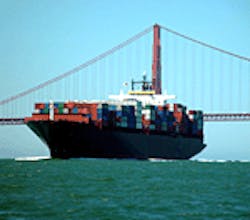Judge Rules Against EPA on Dumping Ships' Ballast Water
A federal court ordered the EPA Thursday to repeal an exemption under the Clean Water Act, in response to a suit brought by environmental groups concerned about the extraordinary economic and ecological consequences of invasive species arriving in U.S. waters through the unregulated ballast water.
The groups asked EPA to withdraw a regulation that illegally exempts such ballast water discharges from Clean Water Act permits. The Court’s ruling means that ships arriving in all United States ports will need to obtain discharge permits before dumping their ballast water or be in violation of the law.
"Over 30 years ago EPA made a grave error in failing to regulate the indiscriminate dumping of invasive species along the nation’s coasts and the Great Lakes, an error it compounded when it refused to grant our petition over six years ago. As a result, we all bear the very high environmental and economic costs associated with these invasive species. Today we’re extremely gratified by the court’s ruling, which brings the requirements of the Clean Water Act to bear on preventing new invasions," said Nina Bell, Executive Director of the Portland, Oregon-based Northwest Environmental Advocates. "It’s a shame that EPA requires a court order to comply with federal law," she added.
Environmental groups first petitioned EPA to regulate ships’ ballast water discharges more than six years ago because ballast water is the nation’s largest source of aquatic invasive species. The groups asked EPA to withdraw a regulation that illegally exempts such ballast water discharges from Clean Water Act permits.
In this long-running saga, the groups most recently asked the federal district court to find that EPA’s 1973 regulation was inconsistent with the Clean Water Act and to order its immediate repeal. Without the regulation, shippers would be required to comply with the Clean Water Act’s permitting program or be in violation of the law.
Deborah Sivas, Director of the Earthjustice Environmental Law Clinic at Stanford said, "This is a decisive legal victory. It will provide protection against invasive species in hundreds of bays, rivers and streams throughout the country and in our oceans out to three miles."
Sarah Newkirk, clean oceans advocate for The Ocean Conservancy said, "Invasive species carried in ships’ ballast water have measurable impacts to businesses, taxpayers and the environment. They harm commercial fishing and shellfishing, clog the intake pipes of power plants and drinking water treatment facilities, destroy habitats and push threatened species to the edge of extinction. Ballast water is the biggest source of new aquatic species making homes for themselves in the country’s coastal waters. It’s high time EPA placed the burden of controlling invasive species on those who create the problem."
Live species from other countries are carried to U.S. waters in ballast water which ships use for stabilization. The ballast water can be discharged into bays, estuaries, and the Great Lakes as ships approach port and when cargo for export is loaded. Over 21 billion gallons of ballast water from international ports is discharged into U.S. waters each year. Estimates of the cost of invasive species to the U.S. economy are in the billions of dollars annually.
The lawsuit was brought by Northwest Environmental Advocates, The Ocean Conservancy, and Baykeeper, three of the original signers of the petition filed in January 1999. After having been forced through an initial lawsuit to answer the groups’ petition, EPA denied it on September 2, 2003, refusing to implement the permitting program and control a threat that has caused billions of dollars of damage. At the time, the agency admitted that the Clean Water Act "does not explicitly exclude such discharges from permitting requirements."
"This is a stunning victory for the environment and San Francisco Bay," said Leo O’Brien, Executive Director of Baykeeper. "The Bay-Delta estuary is a poster child for the harm caused by invasive species carried in ballast water. It is the most invaded estuary in North America and possibly the world. The invaders like the Asian clam, the green crab, and the Chinese mitten crab now dominate the native species and it’s getting worse: on average a new species establishes itself in the Bay every 14 weeks. Hopefully the tide is now turning."
The Earthjustice Environmental Law Clinic at Stanford University and Pacific Environmental Advocacy Center at Lewis and Clark Law School in Portland, OR, represent the three organizations.
Source: Earthjustice Environmental Law Clinic
